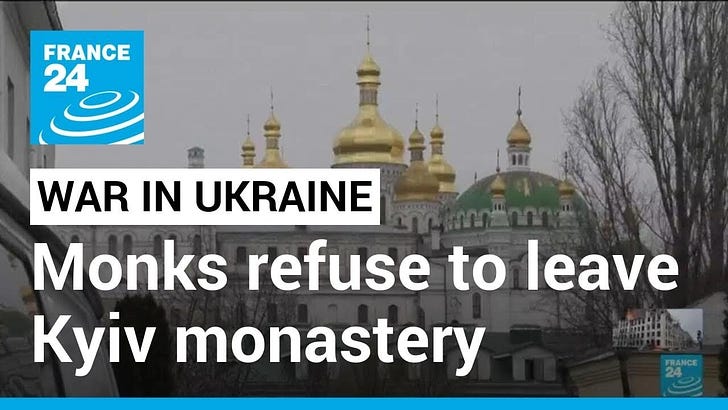I hate to post to say that I don’t know what to make of something.
But I don’t know what to make of this.
Politico EU:
The Ukrainian authorities are considering banning the church [the “Moscow-tied Ukrainian Orthodox Church (UOC)”] — and draft legislation has already been prepared by opposition parties to do just that. Ukrainian President Volodymyr Zelenskyy is expected to make an announcement soon about the future of the church, whether there will be an outright ban or an option for the church to form a new one shorn of any ties to the Russian Orthodox Church and its leader, Patriarch Kirill, a vociferous supporter of the invasion.
But even without the ban the UOC is in rapid decline, with more priests and worshippers poised to defect to the rival, independent Orthodox Church of Ukraine (OCU). Since the invasion more than 200 parishes have switched allegiance; many others are planning to defect but are facing obstacles from UOC authorities, which are trying to block them, including at the Church of Archangel Michael in the village of Zadubrivka in southwest Ukraine.1 [my emphasis]
The Guardian:
Since November, the Ukrainian state has been investigating the Moscow-affiliated Orthodox Church – alleging it is an arm of the Kremlin, disguising Russian propaganda as religious teachings.
Some of the top leaders of the church, along with several key monasteries, have been subject to searches, and several high-profile priests have been charged with treason and inciting religious hatred.
Ukraine’s president, Volodymyr Zelenskiy, said in December that any religious organisation found to be working for Russia would be banned, a move he explained was designed to prevent Russia from weakening Ukraine from within.
The Moscow-affiliated church has been told to leave its headquarters after its lease expired at Kyiv Pechersk Lavra monastery, the most important home of eastern Orthodoxy.2 [my emphasis]
Is it possible for leaders and officials of a church to commit treason and/or to back the Other Side in a war? Of course.
Is the line between dealing with individual violators/criminals/agents and suppressing freedom of religion clear and easily detectable? Not always.
Here’s one messy example3:
Ksenia Luchenko gives this helpful snapshot background.
The Russian leadership is increasingly turning to religious rhetoric in its propaganda around the war against Ukraine, citing defending Orthodoxy and the “de-Satanization” of Ukraine among the aims of the invasion. The Russian Orthodox Church (ROC) apparently sees no problem in bestowing sacred qualities on a brutal war against a neighboring Orthodox country. Nor is the ROC concerned by the impact of its actions on the Ukrainian Orthodox Church (UOC), which has for centuries been part of the ROC, albeit with broad autonomy rights. Now its previous ties with Moscow have left it fighting for survival.4
The Ukrainian government currently sees the Orthodox Church of Ukraine (OCU) as the “good” Orthodox church and Ukrainian Orthodox Church (UOC) as the “bad,” pro-Russian one.
However, as Luchenko recounts, “The [more Russia-friendly] UOC remains the biggest church in Ukraine, a country in which 12 percent of the population go to church weekly, compared with just 6 percent in Russia.” And the supposedly bad UOC “since the start of the war has supported the Ukrainian army, provided humanitarian aid, and helped to organize humanitarian corridors into besieged Mariupol, earning thanks from President Volodymyr Zelensky.“
But she also notes the darker side of the UOC’s situation:
Some of its senior clergy have openly collaborated with the occupying Russian army, raising suspicion about the loyalty of the rest. Since October, the Ukrainian authorities have been carrying out searches of UOC churches and monasteries across the country. Dozens of its senior clergy are now under criminal investigation or on Ukraine’s sanctions list, while some have left for Russia with the retreating Russian army. [my emphasis]
To end where I began: it’s complicated. Luchenko: “A complete ban [on the UOC] is therefore unlikely, but the Ukrainian government is making it clear that the future of the UOC depends on how convincingly it can show that it has severed ties with the ROC [Russian Orthodox Church].”
Vladimir Putin does embrace Orthodox Christianity as part of his general ideology. And it would be surprising if he did not try to use church channels in some ways to support his war aims. But facts matter. And as Luchenko’s description makes clear, the religious affiliations involved are complex and messy.
If you feel inclined, you can check this EU vs. Disinfo report5 for some of the more exotic claims Russia is reportedly making about Ukrainian actions against the UOC. I'm not so impressed with what I've seen of the EU vs. Disinfo site. In this particular article, it notes that "78% of orthodox believers [in Ukraine] claim their allegiance to the [UOC] church." But the link it provides is to a report by a group called InfoSapiens from 04/08/2022, which says:
According to the all-Ukrainian nationally representative Omnibus poll, while 15% of Ukrainians considered themselves members of the UOC-Moscow Patriarchate in February [2022], only 4% remained such in March: hence, the UOC-MP lost 73% of its members. Instead, the share of the OCU parishioners increased from 38% to 52%.
Which, aside from being months out-of-date, seems to be saying almost the opposite of what EU vs. Disinfo says in its January 2023 report. If EU vs. Disinfo wants to be considered a solid source, they really need to tighten up their act.
Dettmar, Jamie (2023): The end of days for Russia’s church in Ukraine. Politico EU 04/24/2023. <https://www.politico.eu/article/end-days-russia-orthodox-church-ukraine/> (Accessed: 2023-26-04).
Koshiw, Isobel (2023): The enemy within? Ukraine’s Moscow-affiliated Orthodox Church faces scrutiny. The Guardian 04/25/2023. <https://www.theguardian.com/world/2023/apr/25/the-enemy-within-ukraines-moscow-affiliated-orthodox-church-faces-scrutiny> (Accessed: 2023-26-04).
Monks at historic Kyiv monastery defy eviction order. FRANCE 24 English YouTube channel 03/29/2023. (Accessed: 2023-26-04).
Luchenko; Ksenia (2023): Can the Ukrainian Orthodox Church Survive the War With Russia? Carnegie politika 01/17/2023. <https://carnegieendowment.org/politika/88811> (Accessed: 2023-26-04).
Disinfo: Persecution of the Ukrainian Orthodox Church Aims to Open Way for Neopaganism in Ukraine. EU vs Disinfo 01/17/2023. <https://euvsdisinfo.eu/report/persecution-of-the-ukrainian-orthodox-church-aims-to-open-way-for-neopaganism-in-ukraine> (Accessed: 2023-26-04).


